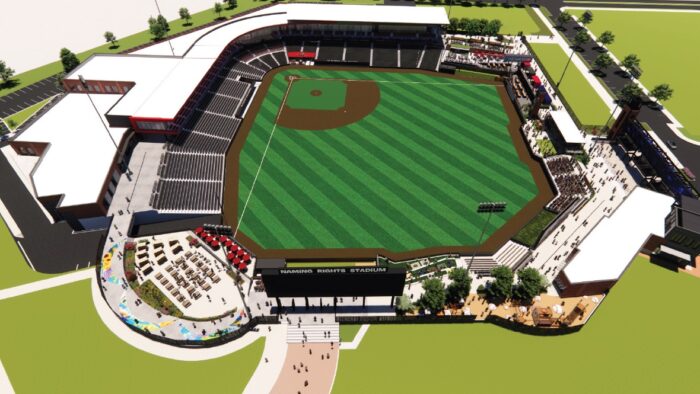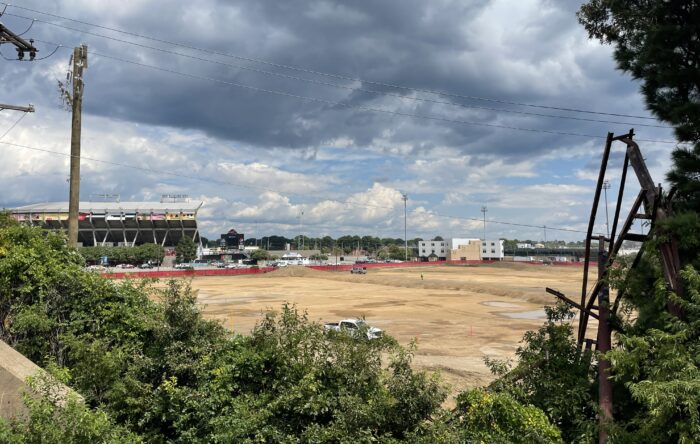
A recent rendering of the stadium planned as part of the Diamond District development in Richmond. (BizSense file)
It’s now fully official: the Richmond Flying Squirrels have inked the deal for their long-awaited new ballpark.
The City of Richmond announced on Monday that the Double-A baseball team and the Richmond Economic Development Authority have formally signed the lease and development agreement for a new $117 million stadium to be built just south of The Diamond as the anchor of the overall Diamond District development.
The signing follows last week’s approval by the EDA of the lease and development agreements and precedes an expected ceremonial groundbreaking and stadium naming rights announcement in the weeks to come.
The signed documents include the Squirrels agreeing to a 30-year lease of the 10,000-seat stadium, which will be owned the EDA, managed and operated by the team, and paid for by bonds issued last month by the city.
In its announcement on Monday, the city said the signing marks “a new era for the Squirrels in Richmond and cementing a long-term partnership between the team and the City of Richmond.
“Richmond just hit a home run,” Richmond Mayor Levar Stoney said in the release. “The Squirrels are an institution here in Richmond, and we have come to an agreement that ensures they stay in Richmond for the long haul, bringing much-needed tax revenue to our city and contributing to the city’s quality of life by providing entertainment and activities for all of our families and residents.”
Lou DiBella, the ballclub’s president, said the deal gives the Squirrels the stadium they have been waiting for since first coming to Richmond in 2010.
“Richmond will finally be getting the ballpark it truly deserves, and we could not be more relieved and gratified,” DiBella said in the release. “The people of Richmond have proven their loyalty to the Squirrels repeatedly, with fans packing our antiquated Diamond every night. It’s thrilling to know that the Flying Squirrels and MiLB will continue to entertain Richmond for decades to come.”

Prep work is already well underway at the new stadium site, as seen on Monday. (BizSense file photo)
While some have questioned the wisdom of using municipal bonds to pay for the project, particularly after it was initially proposed that the stadium would be privately funded, City Council President Kristen Nye said the deal was ultimately supported by many Richmond citizens.
“City Councilmembers are elected to be the voice for their districts and Richmonders throughout the City were clear – they wanted us to do everything possible to ensure the Squirrels stayed home in our great City,” Nye said in the release.
The lease calls for the Squirrels to pay $3.2 million in rent annually for the first 10 years of the 30-year agreement. The rent will then drop to $1.34 million for the 11th year and rise 3% each year thereafter.
That equates to $66 million paid by the Squirrels over the life of the lease.
Virginia Commonwealth University will also pay a yet-undisclosed amount of rent to the EDA for its baseball team’s use of the new stadium.
Those rents will be used to pay off $40 million in lease revenue bonds that are funding infrastructure improvements for the Thalhimer-led first phase of the overall Diamond District development. The stadium is to be financed using $130 million in general obligation bonds, which are to be paid back using tax revenue generated by the overall 67-acre, $2.4 billion project.
Site work for the new stadium is already well underway, with the Squirrels and consultant Machete Group handling its design and development. The ballpark will rise on 10 acres at 2929 N. Arthur Ashe Blvd., just south of The Diamond in the overall Diamond District’s southwest corner at the boulevard and the train tracks.
Monday’s announcement said the stadium is scheduled to be completed in time for the 2026 baseball season.

A recent rendering of the stadium planned as part of the Diamond District development in Richmond. (BizSense file)
It’s now fully official: the Richmond Flying Squirrels have inked the deal for their long-awaited new ballpark.
The City of Richmond announced on Monday that the Double-A baseball team and the Richmond Economic Development Authority have formally signed the lease and development agreement for a new $117 million stadium to be built just south of The Diamond as the anchor of the overall Diamond District development.
The signing follows last week’s approval by the EDA of the lease and development agreements and precedes an expected ceremonial groundbreaking and stadium naming rights announcement in the weeks to come.
The signed documents include the Squirrels agreeing to a 30-year lease of the 10,000-seat stadium, which will be owned the EDA, managed and operated by the team, and paid for by bonds issued last month by the city.
In its announcement on Monday, the city said the signing marks “a new era for the Squirrels in Richmond and cementing a long-term partnership between the team and the City of Richmond.
“Richmond just hit a home run,” Richmond Mayor Levar Stoney said in the release. “The Squirrels are an institution here in Richmond, and we have come to an agreement that ensures they stay in Richmond for the long haul, bringing much-needed tax revenue to our city and contributing to the city’s quality of life by providing entertainment and activities for all of our families and residents.”
Lou DiBella, the ballclub’s president, said the deal gives the Squirrels the stadium they have been waiting for since first coming to Richmond in 2010.
“Richmond will finally be getting the ballpark it truly deserves, and we could not be more relieved and gratified,” DiBella said in the release. “The people of Richmond have proven their loyalty to the Squirrels repeatedly, with fans packing our antiquated Diamond every night. It’s thrilling to know that the Flying Squirrels and MiLB will continue to entertain Richmond for decades to come.”

Prep work is already well underway at the new stadium site, as seen on Monday. (BizSense file photo)
While some have questioned the wisdom of using municipal bonds to pay for the project, particularly after it was initially proposed that the stadium would be privately funded, City Council President Kristen Nye said the deal was ultimately supported by many Richmond citizens.
“City Councilmembers are elected to be the voice for their districts and Richmonders throughout the City were clear – they wanted us to do everything possible to ensure the Squirrels stayed home in our great City,” Nye said in the release.
The lease calls for the Squirrels to pay $3.2 million in rent annually for the first 10 years of the 30-year agreement. The rent will then drop to $1.34 million for the 11th year and rise 3% each year thereafter.
That equates to $66 million paid by the Squirrels over the life of the lease.
Virginia Commonwealth University will also pay a yet-undisclosed amount of rent to the EDA for its baseball team’s use of the new stadium.
Those rents will be used to pay off $40 million in lease revenue bonds that are funding infrastructure improvements for the Thalhimer-led first phase of the overall Diamond District development. The stadium is to be financed using $130 million in general obligation bonds, which are to be paid back using tax revenue generated by the overall 67-acre, $2.4 billion project.
Site work for the new stadium is already well underway, with the Squirrels and consultant Machete Group handling its design and development. The ballpark will rise on 10 acres at 2929 N. Arthur Ashe Blvd., just south of The Diamond in the overall Diamond District’s southwest corner at the boulevard and the train tracks.
Monday’s announcement said the stadium is scheduled to be completed in time for the 2026 baseball season.
It’s nice to see it’s finally moving forward. Should have happened 20 years ago before the AAA Braves left town but that’s history. Whether you agree with the design or the plans, the process is finally moving forward. Time to sit back and enjoy the show.
So there are general obligation bonds and lease revenue bonds totaling $170M. There are lease payments of $66M from the Squirrels and some other payments from the Rams. Hopefully the balance is paid by the taxes generated by the Thalhimer developments on the site. I wish them success. Otherwise, it’s paid by us. I’m not sure this was the deal the city residents were driving for or not, Ms. Nye, but it’s not a home run, Mr. Stoney. I’m going to hold my nose and hope we can steal home.
yeah my first thought is that the lease payments are low. I hope the city is at least preserving a lot of usage rights to the stadium for concerts and such, but sadly I doubt it
The lease payment is reportedly the highest of any minor league baseball team in the country and 15x their current lease. I’m a baseball fan and not necessarily thrilled about financial arrangements regarding stadiums across the country, but I don’t think Richmond could really ask for much more. I’m very intrigued to see the “ancillary” uses of the stadium outside Squirrels/VCU games.
I’m intrigued by the ancillary uses. I get it that the lease number is high for MiLB. Wait until you see the ticket prices!
Same here Bruce. Heard under the lease. The squirrels have final say and will be the main event scheduler so the city can’t actually use the stadium.
Over the 30 year lease, the lease payments are $2.2 million a year. I seriously doubt this the highest in all minor-league baseball. I wish I could see an almost 66% cut in my mortgage payment amount after 10 years on the 30 year note. I hope you had to find any size city comparable to RVA or bigger that used direct general obligation bonds for a stadium that is not tied to any specific revenue stream. FYI, Charlotte Knights pay $1M for the land only and City gave them $7.25M from hotel and motel tax surcharges plus Mecklenburg get… Read more »
Hearing RVA Council members talk about being a voice for their districts…. yeah that’s why we needed two Casino votes – because you listen to the voters.
Bruce: Don’t forget the admission tax, parking fees, meal tax and naming rights as revenue producers.They’ll need every dollar, and a lot of concert dates to pay for the stadium.
Those sources of revenue do not add up to nearly as much as you may believe. And there won’t be much demand for concert dates at a minor league stadium given a new 7500 seat outdoor amphitheater will be opening up soon. Stadium plus debt servicing over 30 years is estimated at $250M. Minus the $66M rent payments is $184M. That leaves roughly $6M/year of payments for the initial construction. Does not even include the ongoing maintenance costs. I doubt the sources of revenue you cite add up to even $2M/yr for a minor league operation. Which should offset the… Read more »